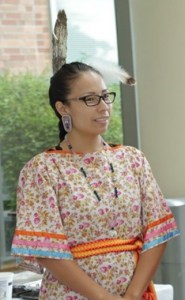
Title: Public Health Training Certificate in American Indian Health
Location: Hunkpati Dakota Oyate
Biography
My father was a maintenance man at the Indian Health Service building on the Crow Creek Sioux Reservation in South Dakota. He worked there for many years and back then we never had a childcare provider. I spent most of my summer days riding my bike from one end of the reservation to the other, fishing, playing, and riding horses. If the weather was bad, my siblings and I would end up at the clinic. I found refuge in the dental office. I was maybe 7 or 8 years old, watching the women answer phones, seat patients, and file charts. And sometimes I even got to take a ride in the chair. I can honestly say it was then that I made the decision to work in a dental office.
My high school career started at a tribal school called Tiospa Zina, which means ‘people from the east’. It was a great experience because I am an enrolled member of the Hunkpati Dakota Oyate and I was able to learn my traditional Dakota language there. Being the oldest daughter in my home meant that it was expected that I take on certain responsibilities in managing our household. As difficult as these challenges were, they were balanced by a community that embraces the popular statement, it takes a village to raise a child.
Because I had to work throughout high school to help provide for my family, I struggled to balance school and work, which resulted in poor grades. I had a difficult time with basic math and science classes so I chose to attend a trade school. After getting my certificate as a dental assistant, I realized my dream by working at the Indian Health Service clinic for a summer, and I quickly realized that I wanted to become a dentist.
My road to dental school began at Salish Kootenai College in Montana as a general science major, from which I transitioned into their Life Science program. After graduating from college, I interned at the Tribal Health Clinic in Polson, Montana. I spent an entire summer shadowing dentists and other health professionals, and I observed first-hand the different diseases that deeply affect my community. I also traveled to after-school programs as well as summer camps across the reservation to teach youth about the importance of good oral hygiene.
Since graduating with my Public Health Training Certificate for American Indian Health Professionals from Johns Hopkins Bloomberg School of Public Health I have been able to broaden my knowledge in how community based participatory research is conducted. I appreciated all the guest speakers that came to share their knowledge. Being able to ask questions and have interactive discussions was the most helpful for me.
I am looking into Master of Public Health programs so that I can concentrate solely on public health within Indigenous communities. I want to increase awareness of health disparities and help to educate communities on changes that can be made to improve the overall quality of life. We need new innovative ideas to help diversify the public health field in a holistic way for our Indigenous people.